
Posted on October 17, 2022
Due to roof repairs and potential danger of falling debris, the part of the Melrose Ave. parking lot that is adjacent to Thompson Hall (closest to Chamberlayne Ave., on the Richmond campus) is temporarily closed until further notice – even if orange traffic cones and caution tape are not in place. This includes weekends and evening hours when no work is occurring because the contractor could have left slate or other materials in a precarious position two to three stories above. Thank you for your understanding and collaboration.
Posted on August 17, 2022
On August 16, 2022, UPSem Library offered a second information session via Zoom for alumni who are interested in learning more about the resources and services available through the Richmond and Charlotte campus libraries. It was hosted by Director of Public and Electronic Services Ryan Douthat and Reference Librarian Robin McCall.
The Alumni Research Portal is a one-stop location from which alumni can access electronic databases, ebooks, contact information, and information about borrowing books and other print materials from the two campus UPSem libraries. In this session, Ryan and Robin show viewers around the Alumni Research Portal, introducing the wide variety of resources available there and how to access all of it.
For anyone who was not able to join us for the session but would like access to the recording, you can find the first part here, and the second part here. Thanks to everyone who attended!
Posted on July 14, 2022
On July 14, 2022, UPSem Library offered an information session via Zoom for alumni who are interested in learning more about the resources and services available through the Richmond and Charlotte campus libraries. It was hosted by Director of Public and Electronic Services Ryan Douthat and Reference Librarian Robin McCall.
The Alumni Research Portal is a one-stop location from which alumni can access electronic databases, ebooks, contact information, and information about borrowing books and other print materials from the two campus UPSem libraries. In this session, Ryan and Robin show viewers around the Alumni Research Portal, introducing the wide variety of resources available there and how to access all of it.
This free information session will be offered again on Tuesday, August 16, 2022, from 8:00 to 9:00 pm. If you would like to join, just click https://us06web.zoom.us/j/8419794964 (meeting ID: 841 979 4964; pass code: 2022Alum). If you’re not able to join us for that session but would like to watch a recording of the July session, please click here to view the video on Vimeo.
Posted on May 9, 2022
Union Presbyterian Seminary’s Richmond Campus will be operating remotely during the week of May 9-14, 2022. Accordingly, the Morton Library building will be closed from 2:00 p.m. on Monday, May 9 to 8:00 a.m. on Monday, May 16. Librarians will still be available via email and the following remote services will be offered:
We apologize for this inconvenience and look forward to re-opening Morton Library on Monday, May 16.
Posted on January 14, 2022
To protect UPSem Library staff and patrons during the current Omicron surge, during which all class meetings have been moved online, the following Library service policies will apply on the Richmond campus from Saturday, January 15th until Sunday, January 30th:
- Morton Library hours will be 8:00 a.m. to 7:00 p.m. Monday through Thursday, 8:00 a.m. to 6:00 p.m. Friday, closed Saturday and Sunday
- Physical Library access will be limited to current students, faculty, staff, and members of the following groups who agree to abide by campus protocols: alumni, carrel holders, approved visiting researchers.
- Beginning Tuesday January 18, Library users may either text or call this number to request admission to the Library building during operating hours: (804) 362-7366. This number will be distributed via email and posted on the Library’s front door, on the Library web site home page, in “UPSem Community Life – Richmond Campus” and other relevant Facebook groups.
- The Library will offer a once-a-day touchless pick-up-service M-F starting at noon for books placed on hold by 8:00 a.m. To pick up these books, Library users may text or call the number listed above.
- Zoom-based reference appointments may be scheduled through the Library’s Ask a Librarian service.
- Receipt of book donations will be temporarily suspended.
We apologize for these temporary changes and look forward to a return to our regular service schedule on January 31st, pending further developments.
Posted on February 11, 2021
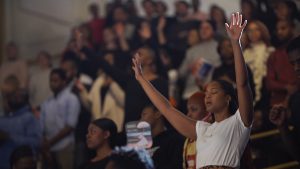
The church has long stood at the heart of Black culture in America. As a result, the study of the Black church experience(s), Black Christianity, and Black theologies is a critical aspect of the study, not only of religion in America, but of American history, politics, and sociology. In celebration of Black History Month, UPSem Libraries would like to highlight some of the most recent resources we have to offer on this important topic — most of the resources in this post were published within the last five years. In the coming weeks, we will also be building a much more extensive guide to resources for studying Black church history and sociology; we’ll link that on the Library website and post it on our Facebook page when it goes live. Meanwhile, if you are interested in learning more about the role of the Black church in American history and culture, why not start your exploration by checking out some of the resources below?
Databases and Research Guides:
Katie Geneva Cannon Research Collection: This research guide is a central source for information relating to the extraordinary life and work of Professor Katie Geneva Cannon, an esteemed and beloved leader of the Union Presbyterian Seminary community and a major scholar and authority in the field of Womanist theology and ethics. The guide is maintained by our Instructional Resources Librarian, Dora Rowe, and developed in conversation with the Katie Geneva Cannon Center for Womanist Leadership at UPSem.
Encyclopedia of Religion in America: This database examines how religious history and practices are woven into the political, social, cultural, and historical landscape of North America. Articles on “Abolitionism and Antislavery,” numerous African-American church denominations, “African American Religion” in several historical eras, and “Race and Racism” are just some of the topics you’ll find covered here.
African-American Historical Serials Collection: This database is a centralized and accessible resource of formerly fragmentary, widely-dispersed and endangered primary source materials related to African-American life and culture, collected from 75 institutions. It includes extensive coverage of Black churches and religious organizations.
E-books:
- Antonia Michelle Daymond, ed., T&T Clark Handbook of African American Theology (New York: T&T Clark, 2019)
- Barbara Ann Holmes, Joy Unspeakable: Contemplative Practices of the Black Church (Minneapolis: Fortress Press, 2017)
- Nyasha Junior and Jeremy Schipper, Black Samson: The Untold Story of an American Icon (New York: Oxford University Press, 2020)
- Courtney Pace, Freedom Faith: The Womanist Vision of Prathia Hall (Athens, Ga: The University of Georgia Press, 2019)
Wylin W. Wilson, Economic Ethics and the Black Church (Cham, Switzerland: Palgrave MacMillan, 2017)
Raphael G. Warnock, The Divided Mind of the Black Church: Theology, Piety, and Public Witness (New York: New York University Press, 2014) — This resource is a little more than 5 years old, but Rev. Dr. Warnock’s recent election in Georgia to the U.S. Senate makes it an especially interesting one!
Robert A. Wortham, ed., W. E. B. Du Bois and the Sociology of the Black Church and Religion, 1897-1914 (Lanham, Md: Lexington Books, 2017)
Books in the Reference Room:
- Paul Finkelman, ed., Encyclopedia of African American History 1619-1895: The Colonial Period to the Age of Frederick Douglass (3 vols.; New York: Oxford University Press, 2006)
- Paul Finkelman, ed., Encyclopedia of African American History 1896 to the Present: From the Age of Segregation to the Twenty-First Century (5 vols.; New York: Oxford University Press, 2006)
- Gerald D. Jaynes, ed., Encyclopedia of African American Society (2 vols.; Thousand Oaks, Ca: Sage Publications, 2005)
- Jeffrey Lehman, ed., Reference Library of Black America (5 vols.; Farmington Hills, Mi: Gale Group; African American Publications, 2003)
- Jack Salzman, David L. Smith, and Cornel West, eds., The Encyclopedia of African-American Culture and History (New York: MacMillan Library Reference, 1996-2000)
Books in the stacks:
- Wayne E. Croft, A History of the Black Baptist Church: I Don’t Feel No Ways Tired (Valley Forge, Pa: Judson Press, 2020)
- Henry Louis Gates, Jr., The Black Church: This Is Our Story, This Is Our Song (New York: Penguin Press, 2021)
- Nicole Myers Turner, Soul Liberty: The Evolution of Black Religious Politics in Postemancipation Virginia (Chapel Hill: The University of North carolina Press, 2020)
- Alton B. Pollard, The Black Church Studies Reader (New York: Palgrave MacMillan, 2016)
- Joseph L. Tucker Edmonds, The Other Black Church: Alternative Christian Movements and the Struggle for Black Freedom (Lanham, Md: Lexington Books / Fortress Academic, 2021)
- Grace Yukich, Religion Is Raced: Understanding American Religion in the Twenty-First Century (New York: New York University Press, 2020)
Streaming Video Resources:
The Black Church and Black Struggle (SNCC 50th anniversary conference, 2011)
SNCC 50th Anniversary Conference Volume 23 – FEATURED SPEAKERS: Rev. Bernard Lafayette (SNCC Field Secretary), Rev. Nelson Johnson (Student Organization for Black Unity), Rev. David Forbes (Raleigh Student Movement). The Black church was born in struggle in the midst of slavery, and despite laws and vigilante actions targeting it for destruction the church has not only survived, but has played a sustained and central role over more than 300 years of Black struggle in America. This panel of Black churchmen, with very active audience participation, reflects and examines the historical role of the church, its specific role in the Movement of the 1960s, and the lessons of that struggle for today.
Interview with Albert Raboteau, Professor of Religion, Princeton U. (2017)
Albert Raboteau is interviewed about 1793 and the hope brought by the American Revolution, Richard Allen’s conversion experience, Christianity and self-worth, founding of the Free African Society, founding of the African Methodist Episcopal Church, the Yellow Fever epidemic in Philadelphia, Richard Allen’s reaction to the American Colonization Society, white Christianity vs. black Christianity, Nat Turner’s Rebellion, Denmark Vesey’s Conspiracy, Gabriel’s Rebellion, Jarena Lee’s conversion, separation of families, slave preachers, free black preachers and abolition.
Thank God: An Aframerican Docu-Drama (1985, Tony Brown Productions)
Part One
Part Two
Part Three
Part Four
‘The music of the black religious experience,” contends Tony Brown, host of the televised “Journal” that bears his name, “is the primary root of all music born in the United States.” This performance/documentary is about the history of the black church in the United States.
Between the World and Me (2020, HBO)
First published in 2015, Between The World And Me was written as a letter to Coates’ teenage son, and recounts the author’s experiences growing up in Baltimore’s inner city and his growing fear of daily violence against the Black community. The narrative explores Coates’ bold notion that American society structurally supports white supremacy. Based on the 2018 adaptation and staging of the book at the Apollo Theater, this HBO Special combines elements of the Apollo’s production, including powerful readings from Coates’ book, and incorporates documentary footage from the actors’ home life, archival footage, and animation. An HBO Production.
This recent film is not specifically about the Black church, it’s true. However, in his original letter, Ta-Nehisi Coates does frequently address the role of the church in individual lives and in Black culture. He is candid about his own departure from Christianity, and strives “to articulate a black politics without churchiness,” as Tressie McMillan Cottom writes for The Atlantic (“Between the World and Me Book Club: Not Trying to Get Into Heaven,” Aug 3, 2015). Studying the history of the Black church also requires an openness to the voices of those who criticize or even leave it.
Events:
The Katie G. Cannon Center for Womanist Leadership invites you to sign up for its 2021 Spring Virtual Conference, “The Hinges Upon Which the Future Swings: Womanism as a Gateway to Our Future(s).” Apr 8-10, 2021.
From the conference description: “Through panels, presentations, interviews, lectures, and multifaceted, transgenerational, innovative conversations across disciplines, this conference is the culmination of the work of KGCCWL integrating its six-core tenets – womanist wellness, witness, wisdom, worship, wares, and works – which represent the holistic interconnections that make womanist leadership flourish.”
Learn more and register here.
Posted on January 6, 2021
Happy New Year! Now that 2021 is upon us, it will be time soon to begin your planning for the spiritual journey through Lent. The staff of Morton Library proudly recommends a new adult curriculum by our own Circulation Supervisor, Rev. Lisa R. Janes, released in December by the Katie Geneva Cannon Center for Womanist Leadership, entitled “It’s A New Day”: A Lenten Journey with Sonia Sanchez.
From the Cannon Center’s own press release:
“Aaaayee Babo (Praise God), It’s A New Day!”
As we move into the season of Lent in the Christian year 2021, the Katie Geneva Cannon Center for Womanist Leadership is excited to launch a new adult curriculum titled “’It’s A New Day’: A Lenten Journey with Sonia Sanchez,” developed by Reverend Lisa R. Janes.
This study guide story-links the life, poetry, and activism of Dr. Sonia Sanchez to the life and ministry of Jesus, beginning with his baptism at the Jordan River and culminating with his journey to the cross on Good Friday.
As a poet, playwright, author, professor, and mother, Dr. Sanchez is a warrior-woman of words. She pioneered in the halls of academia, during the turbulent 1960s and 1970s, the introduction of black literature, or what is known today as African American literature. In 1969, while teaching at the University of Pittsburgh, she was the first to create and teach a course based on the Black Woman and Literature in the United States.
Her poetry and unique lyricism of language, which ranges from prophetic, radical, and revolutionary to contemplative, has inspired many in the hip-hop and spoken word communities. As an evolutionary-revolutionary who is now 86 years strong, Dr. Sanchez has continued in her quest, as a co-founder of the Black Arts Movement and a participant in the Nation of Islam, the American Civil Rights Movement, and the Black Power Movement, to ask the relevant question for the 21st century, “What does it mean to be human?”
Through this Lenten journey study, you will discover that you must learn how to breathe and come to your senses as you battle the vicissitudes of life, for it is in the experience of our trauma and pain that we emerge as true warriors—paraphrasing the words of Sonia Sanchez—“badddDDD, badder than bad!”
- The Reverend Lisa R. Janes, a native of Richmond, Virginia, is the only child born to the late Burnett L. Janes. She earned a Bachelor of Fine Arts and a Master of Fine Arts from Virginia Commonwealth University. She received her Master of Divinity at the Samuel DeWitt Proctor School of Theology at Virginia Union University in 2008. She was ordained to the gospel ministry in 2010 and served as Minister of Christian Education at Faith Community Baptist Church in Richmond, VA from 2011-2015. Currently, she serves as an Associate Pastor. Rev. Janes is currently employed as a Circulation Supervisor at the William Smith Morton Library on the campus of Union Presbyterian Seminary.
The Lenten guide is available now at the Katie Geneva Cannon Center for Womanist Leadership website. Simply scroll down to the bottom of the page to download the guide for free.
Congratulations, Lisa, and thank you for sharing this resource with the UPSem community!
Posted on December 11, 2020
We’ve just launched a new page on the Library website to make locating our online databases even easier! You’ll still find the link to the Online Databases in the same place, under the “Library Resources” menu heading on the homepage. The page will open in a new tab.
The new page is an A-Z list of all the databases to which the Library has access. If you know the name of the database you want to use, you can either click on the first letter of its name at the top of the page or just scroll down the alphabetical list to find it. Each database includes a short description of what you’ll find inside it. Clicking on the blue title of the database will cause the database to open in a new link. Remember that, if you’re off campus, you’ll need your bar code number and password in order to use the databases.
You can also use the menu bar at the top of the new page to search the databases by subject heading and by keyword. (Heads up: the keyword search at the top right of the page searches the database names and descriptions, not the databases themselves. In order to search the databases’ contents, you have to click on the database and search inside it.) The dropdown subject menu offers a list of topics to choose from; it’s a good way to narrow down the list of databases to ones that are most likely to be relevant to your research. You’ll find some specificity in the more classically seminary-focused options: New Testament, Hebrew Bible, Christian education, church history, theology, preaching and worship, and many other areas of theological study have their own headings. You’ll also find lots of topics that are not typical “seminary” subjects. Did you know we have databases for everything from the visual arts, economics, and law to psychology, environmental science, and education? If you’re working on an interdisciplinary paper or project — something that combines theology or biblical studies or Christian education with a non-theological field — chances are we have full-text database resources you can use. We’d also like to highlight the fact that one of the subject headings is Spanish-Language Resources — these are databases that are intentional about including research materials in Spanish, and will continue to update their Spanish-language offerings.
On the right side of the page you’ll find a list of the most popular databases, so if you can’t remember which database you want, look there — it’s probably one of the big ones like Academic Search Complete, ATLAS Plus, or JSTOR. A little further down the page on the right side, you’ll also find a list of our newest databases, or databases to which we have a trial membership for a limited time. Right now we’re using that section to highlight all the databases we have that you might not expect to find in a theological library.
Two brand-new databases, APA PsycBooks and APA PsycTests, are listed on the page but do not yet have live links. We’ll have access to those in just a few days, and we’ll let you know on the Library’s Facebook page when they’re available.
Posted on December 8, 2020
While working under the conditions imposed by the COVID-19 pandemic, it can be especially difficult to reach people at their office or to find out who to contact about something, so the UPSem Library has recently revised its Richmond Staff page to make that easier. The page still offers an alphabetical list of Library staff members with their contact information, but it now starts with an “accordion-style” box with sections that expand to reveal contacts for eleven particular types of services/questions, both in Richmond and in Charlotte:
- Library Circulation & Course Reserves
- Reference Services
- Library and In-Class Instruction
- Instructional Resource Center
- Interlibrary and Intralibrary Loan
- Extension (Mailing) Service for Alumni
- Library Archives & Special Collections
- Electronic Resource Support
- Library Acquisitions and Serials
- Cataloging and Technical Services Staff
- Library Administration
We hope that this update will make it easier for Library users to find the help that they need in a timely manner. Though Library staff members are often working away from their offices at this time, voicemail messages should forward to their email accounts, so feel free to call (and leave voicemail) or email. We’re ready to help.
For more information on how Library access and services are being provided during the pandemic, with links to our web-based support and appointment services, please see the earlier news post titled, “Is the Library Still Closed?“
Posted on December 4, 2020
Concordances are alphabetical collections of words that occur in a given text (such as the Bible), each entry of which includes a list of citations of all the passages in which that word occurs. There are biblical concordances in almost every language. The most famous English-language concordance is probably James Strong’s New Exhaustive Concordance of the Bible, which the Library has in print. Indeed, we have shelves of concordances in the Reference room, in many languages! That doesn’t do you much good, though, if you can’t easily get to the Library. (Remember, if you’re in the Richmond area, you can always make an appointment to come in and research for up to two hours every weekday!) What options do you have for doing concordance work from home? Fortunately, there are plenty of other English-language concordances besides Strong’s, including John Kohlenberger’s excellent Concise Concordance to the New Revised Standard Version and Concise Concordance to the New American Bible. The Library has both of these available in digital format.
For your biblical studies courses, you’ll also need to use Hebrew and Greek concordances. While we have many of these in print form (in addition to bible-study software on the computers in the Reference room), they are much harder to find in digital format. If you’ve kept your Hebrew-class copy of the Brown-Driver Briggs Hebrew and English Lexicon, you’ll find that it can function to some extent as a Hebrew concordance: the dagger symbol (†) that you’ll see in front of many (but not all) word entries means that the entry lists every occurrence of that word in the Hebrew Bible. BDB is also linked to Strong’s Concordance — it provides the Strong’s number for each Hebrew word. As for Greek concordances, the Library does have Moulton’s A Concordance to the Greek Testament available as an e-book. The e-book’s search function will allow limited searching if you have a Greek keyboard or font installed on your computer (note that entry headings are printed, and thus must be searched, in upper-case Greek letters). However, it is unfortunately quite a slow process to flip through the pages of the e-book to find what you’re looking for.
Are there any better options for doing Hebrew and Greek concordance work from your home? Fortunately there is indeed a very good, totally free option: BibleHub.com offers concordance options in English, Hebrew, and Greek! Let’s say you want to research the word in Exodus 3:7 that is translated “their cry” (NRSV). Go to BibleHub and use the dropdown menus at the top of the page to select Exodus 3:7. Then click “Interlin” (that is, “Interlinear”) in the menu bar that begins with the word “Parallel.”
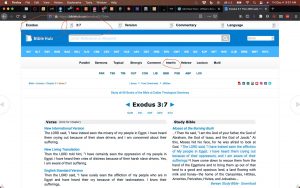
You’ll see the verse in Hebrew and English, with a Strong’s Concordance number over each English transliteration of the Hebrew word. We’re interested in ṣaʿăqātām:
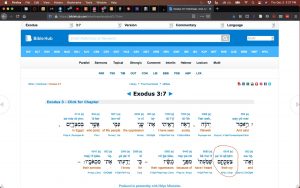
Click on the transliterated word. In the left column you have the Englishman’s Concordance, which tells you that this exact word — the suffixed form “their cry” — occurs in Genesis 19:13 and Exodus 3:7. In the right column you’ll find the Strong’s number for this word, 6818. The Strong’s number is associated with the unsuffixed form of the word (ṣaʿăqāh) rather than the exact word in this verse, so the list under the Strong’s number includes occurrences of the unsuffixed noun as well as instances where it occurs with the definite article or other prefixes, with different suffixes, in plural form, in construct, etc. The “Additional Entries” list includes other word forms that are based on this word’s Hebrew root, ṣʿq, so you can research verbal forms as well.
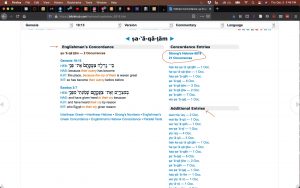
Clicking on the Strong’s number will take you to lots more information, including the BDB entry for the noun and the Englishman’s Concordance listings for the biblical verses that use this noun in different affixed forms.
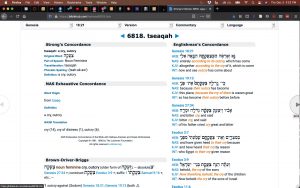
You can do the same kind of thing with Greek words, by clicking on their transliteration.
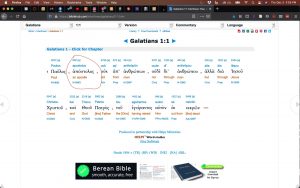
Performing word studies in this way is, admittedly, not as easy as simply opening a book and looking up the information you need. However, it’s good to know we have some effective options until we can get back to the normal ways of using the library!






